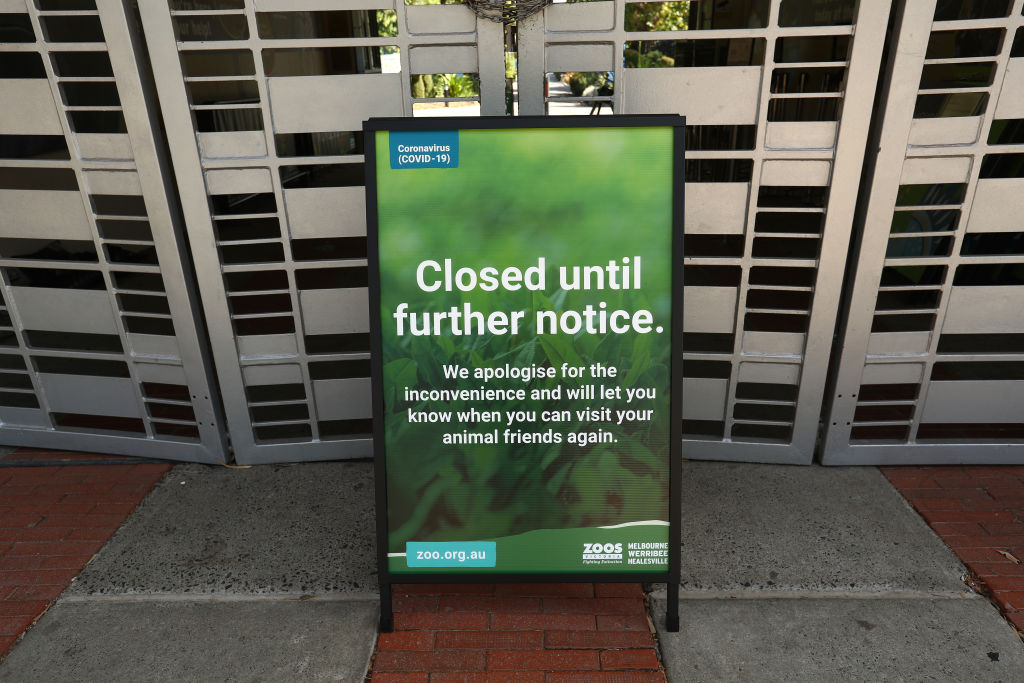America isn't reopening by Easter. But how long should the coronavirus shutdown optimally last?


A free daily email with the biggest news stories of the day – and the best features from TheWeek.com
You are now subscribed
Your newsletter sign-up was successful
There will be a real human cost if the U.S. tries to return to normalcy too soon after this period of coronavirus paralysis — increased deaths, lots more physical pain and suffering, collapsing medical systems. But there are also very steep social and economic costs to locking down much of the country, and those will mount the longer the shutdowns continue.
President Trump — also fretting over the personal political price of the tanking economy, as CBS News reports below — is pushing for the country to start jumping from isolation to work by Easter, April 12. On Thursday, he proposed reopening in phases.

Trump can't compel states and cities to reopen before they are ready. But governors and mayors will have to make cost-benefit decisions about when to start lifting restrictions. Nicholas Kristof and Stuart Thompson at The New York Times worked with epidemiologists to create an interactive model demonstrating "why quickly returning to normal could be a historic mistake that would lead to an explosion of infections, hospitalizations, and deaths."
The Week
Escape your echo chamber. Get the facts behind the news, plus analysis from multiple perspectives.

Sign up for The Week's Free Newsletters
From our morning news briefing to a weekly Good News Newsletter, get the best of The Week delivered directly to your inbox.
From our morning news briefing to a weekly Good News Newsletter, get the best of The Week delivered directly to your inbox.
With the 14 day shutdown Trump is promoting, the model predicts 126.5 million Americans infected with the coronavirus by late October and 1.3 million deaths; after 56 days, 19.1 million Americans would contract the virus and 115,700 would die. You can fiddle with the length and severity of social distancing, plus other factors.
The epidemiologists Kristof and Thompson spoke with suggested scenarios in which certain parts of the U.S. opened first or regions shifted between hospital-saving periods of extreme social distancing and virus-feeding normalcy "breaks." Microsoft founder Bill Gates dismissed an incremental, middle-ground approach on CNN Thursday night. "The sooner we take this medicine, which is tough medicine, the sooner we'll be out of it and not have to go back into it again," he told Anderson Cooper and Dr. Sanjay Gupta. And with cases still rising across the U.S., "the light is not at the end of the tunnel in terms of a mid-April reopening."
"By summer, I think the rich countries that have been competently led on this will not have to go back into shutdown," Gates said. "And from the disease point of view, they'll avoid very large numbers of deaths." It's not clear he included the U.S. in that category. Peter Weber

A free daily email with the biggest news stories of the day – and the best features from TheWeek.com
Peter has worked as a news and culture writer and editor at The Week since the site's launch in 2008. He covers politics, world affairs, religion and cultural currents. His journalism career began as a copy editor at a financial newswire and has included editorial positions at The New York Times Magazine, Facts on File, and Oregon State University.
-
 What to know before filing your own taxes for the first time
What to know before filing your own taxes for the first timethe explainer Tackle this financial milestone with confidence
-
 The biggest box office flops of the 21st century
The biggest box office flops of the 21st centuryin depth Unnecessary remakes and turgid, expensive CGI-fests highlight this list of these most notorious box-office losers
-
 What are the best investments for beginners?
What are the best investments for beginners?The Explainer Stocks and ETFs and bonds, oh my
-
 TikTok secures deal to remain in US
TikTok secures deal to remain in USSpeed Read ByteDance will form a US version of the popular video-sharing platform
-
 Unemployment rate ticks up amid fall job losses
Unemployment rate ticks up amid fall job lossesSpeed Read Data released by the Commerce Department indicates ‘one of the weakest American labor markets in years’
-
 US mints final penny after 232-year run
US mints final penny after 232-year runSpeed Read Production of the one-cent coin has ended
-
 Warner Bros. explores sale amid Paramount bids
Warner Bros. explores sale amid Paramount bidsSpeed Read The media giant, home to HBO and DC Studios, has received interest from multiple buying parties
-
 Gold tops $4K per ounce, signaling financial unease
Gold tops $4K per ounce, signaling financial uneaseSpeed Read Investors are worried about President Donald Trump’s trade war
-
 Electronic Arts to go private in record $55B deal
Electronic Arts to go private in record $55B dealspeed read The video game giant is behind ‘The Sims’ and ‘Madden NFL’
-
 New York court tosses Trump's $500M fraud fine
New York court tosses Trump's $500M fraud fineSpeed Read A divided appeals court threw out a hefty penalty against President Trump for fraudulently inflating his wealth
-
 Trump said to seek government stake in Intel
Trump said to seek government stake in IntelSpeed Read The president and Intel CEO Lip-Bu Tan reportedly discussed the proposal at a recent meeting
